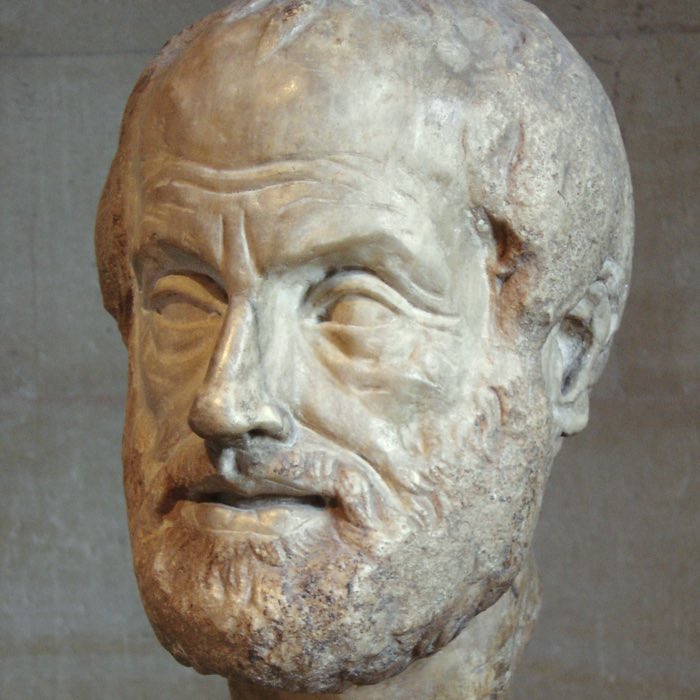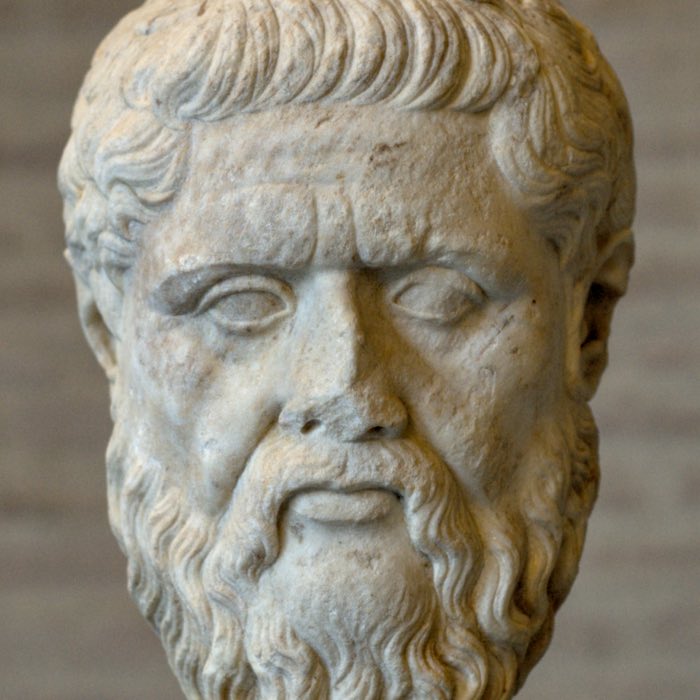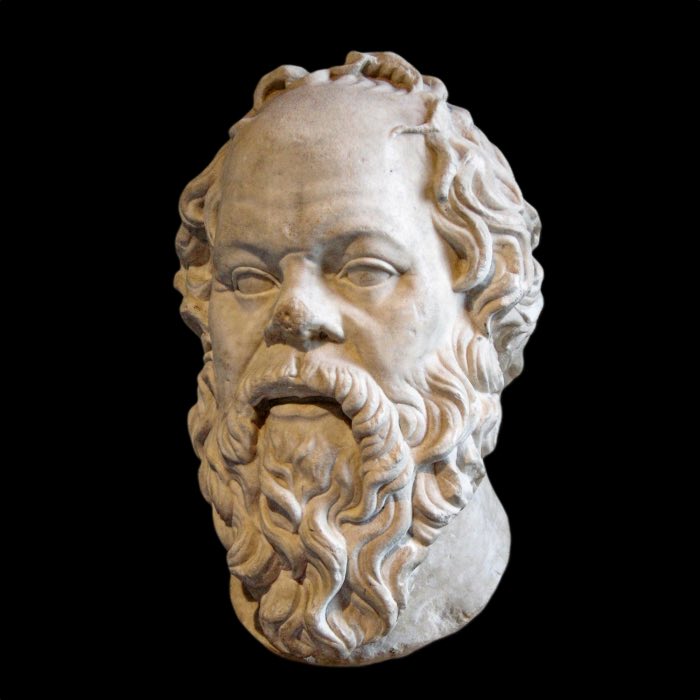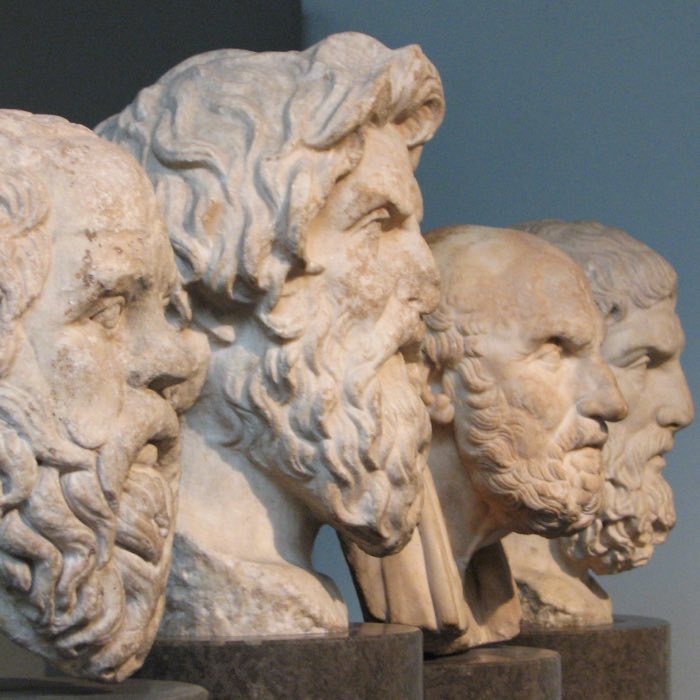The Sophists: Teachers of wisdom and controversial figures of classical greece
The Sophists were a diverse group of itinerant intellectuals and educators who flourished in the 5th century BCE during the height of classical Greece. Renowned for their skill in rhetoric, argumentation, and teaching, they offered instruction in practical subjects such as public speaking, ethics, and political theory, often for a fee. The term “Sophist” derives from the Greek word sophos, meaning “wise”, reflecting their self-identification as purveyors of wisdom. Yet, the Sophists were also polarizing figures, celebrated by some as pioneers of critical thinking and vilified by others, including Socrates and Plato, as manipulators of truth and morality.

The Death of Socrates by Jacques-Louis David, 1787. Socrates regularly opposed the sophists, unmasking their impostures. Source: Wikimedia Commonsꜛ (license: public domain)
The historical context of the Sophistic movement
The Sophists arose in the vibrant intellectual milieu of 5th-century Athens, a city-state known for its democratic governance, flourishing arts, and robust public discourse. The establishment of democracy in Athens created a demand for rhetorical skill, as citizens were expected to participate actively in the Assembly, courts, and other public forums. This demand provided an opportunity for the Sophists, who offered instruction in the art of persuasion and the tools necessary for success in public life.
The Sophists traveled widely, teaching in various Greek cities and attracting students from diverse backgrounds. Their teachings were eclectic, encompassing subjects such as grammar, logic, ethics, political theory, and natural philosophy. However, they were united by a common emphasis on human affairs and the practical application of knowledge.
The Sophistic method: Rhetoric and relativism
The Sophists are perhaps best known for their mastery of rhetoric, the art of persuasive speech. They believed that language was not merely a tool for communication but a powerful instrument for shaping thought, opinion, and social order. Through the use of rhetorical techniques, such as logical argumentation, analogies, and appeals to emotion, the Sophists demonstrated the capacity of language to influence and persuade.
This focus on rhetoric was closely tied to the Sophists’ relativistic approach to truth and morality. Prominent Sophists such as Protagoras famously declared, “Man is the measure of all things”, suggesting that truth is subjective and dependent on individual perception. Similarly, Gorgias argued that objective knowledge is unattainable and that persuasive speech is the primary means of navigating the complexities of human experience.
This relativistic stance challenged traditional Greek beliefs in objective truth, divine authority, and absolute morality. By emphasizing the contextual and contingent nature of human understanding, the Sophists opened the door to a more critical and pluralistic approach to knowledge and ethics.
Prominent Sophists and their ideas
The Sophists were a diverse group, and their ideas reflect a wide range of interests and perspectives. Among the most influential figures were Protagoras, Gorgias, Hippias, and Antiphon, each of whom contributed to the intellectual debates of their time.
Protagoras, often considered the first Sophist, was renowned for his relativism and his teachings on ethics and education. He argued that human beings must rely on practical judgment and consensus to navigate moral and political dilemmas, given the absence of absolute truths.
Gorgias, a master rhetorician, explored the nature of language and its relationship to reality. In his work On Non-Being, Gorgias argued that nothing exists, that even if it did, it could not be known, and that if it could be known, it could not be communicated. This provocative argument underscores the Sophistic emphasis on the limitations of human knowledge and the power of rhetoric.
Hippias was celebrated for his polymathy, offering instruction in a wide range of subjects, including mathematics, astronomy, and history. He also advocated for the idea of natural law, suggesting that universal principles of justice transcend the conventions of individual societies.
Antiphon, known for his writings on justice and human nature, argued that conventional laws often conflict with natural instincts and that true justice lies in aligning human behavior with natural principles.
Criticisms and controversies
The Sophists were not without their critics. Socrates, Plato, and later Aristotle accused them of undermining moral and intellectual standards by promoting relativism, skepticism, and the pursuit of personal advantage over truth. In Plato’s dialogues, the Sophists are often portrayed as opportunists who use rhetorical skill to manipulate rather than enlighten, prioritizing persuasion over genuine understanding.
The Sophists’ practice of charging fees for their instruction also attracted criticism. Traditionalists viewed this as a corruption of the pursuit of wisdom, which they believed should be motivated by a love of knowledge rather than financial gain. This perception contributed to the negative connotation of the term “Sophist” in later philosophical discourse, where it became synonymous with sophistry — deceptive reasoning or argumentation.
Despite these critiques, many of the Sophists’ ideas were far more nuanced and constructive than their detractors acknowledged. Their relativism, for example, can be seen as an early recognition of cultural diversity and the subjective nature of human experience. Similarly, their focus on rhetoric and argumentation laid the foundation for the development of democratic discourse and legal practice.
The legacy of the Sophists
The Sophists’ impact on Western thought is profound and multifaceted. Their emphasis on rhetoric and communication established the foundations for the discipline of rhetoric, which became a central component of education in the ancient and medieval worlds. Their explorations of relativism, skepticism, and the nature of knowledge influenced subsequent philosophical traditions, including the works of Montaigne, Nietzsche, and postmodern thinkers.
The Sophists also played a crucial role in shaping the intellectual environment of classical Athens, fostering a spirit of critical inquiry and debate that would inspire the works of Socrates, Plato, and Aristotle. Although these later philosophers often defined themselves in opposition to the Sophists, their engagement with Sophistic ideas demonstrates the enduring relevance of the Sophistic movement.
In contemporary thought, the Sophists are increasingly recognized as pioneers of critical thinking, cultural relativism, and the practical application of philosophy. Their insights into the power of language, the contingency of knowledge, and the complexity of ethical and political life continue to resonate in debates about truth, morality, and human understanding.
Conclusion
The Sophists were innovative and controversial figures who challenged the intellectual and moral certainties of their time. By emphasizing the power of rhetoric, the relativity of truth, and the importance of human judgment, they laid the groundwork for disciplines ranging from political theory to linguistics. While their legacy has often been overshadowed by the criticisms of Socrates and Plato, the Sophists remain an essential chapter in the history of philosophy, exemplifying the transformative potential of critical inquiry and education.
References and further reading
- Klaus Döring, Michael Erler, Die Philosophie der Antike. Bd. 2/1. Sophistik, Sokrates, Sokratik, Mathematik, Medizin, 1998, Schwabe, Aus der Reihe: Grundriss der Geschichte der Philosophie, ISBN: 9783796510366
- Kerferd, G. B., The Sophistic Movement, 1981, Cambridge University Press, ISBN: 978-0521283571
- Guthrie, W. K. C., The Sophists, 2008, Cambridge University Press, ISBN: 978-0521096669
- de Romilly, J., The Great Sophists in Periclean Athens, 1998, Oxford University Press, ISBN: 978-0198238072
- Kennedy, G. A., Classical Rhetoric and Its Christian and Secular Tradition from Ancient to Modern Times, 2003, University of North Carolina Press, ISBN: 978-0807824672
- Jarratt, S. C., Rereading the Sophists: Classical Rhetoric Refigured, 1998, Southern Illinois University Press, ISBN: 978-0809322244
















comments